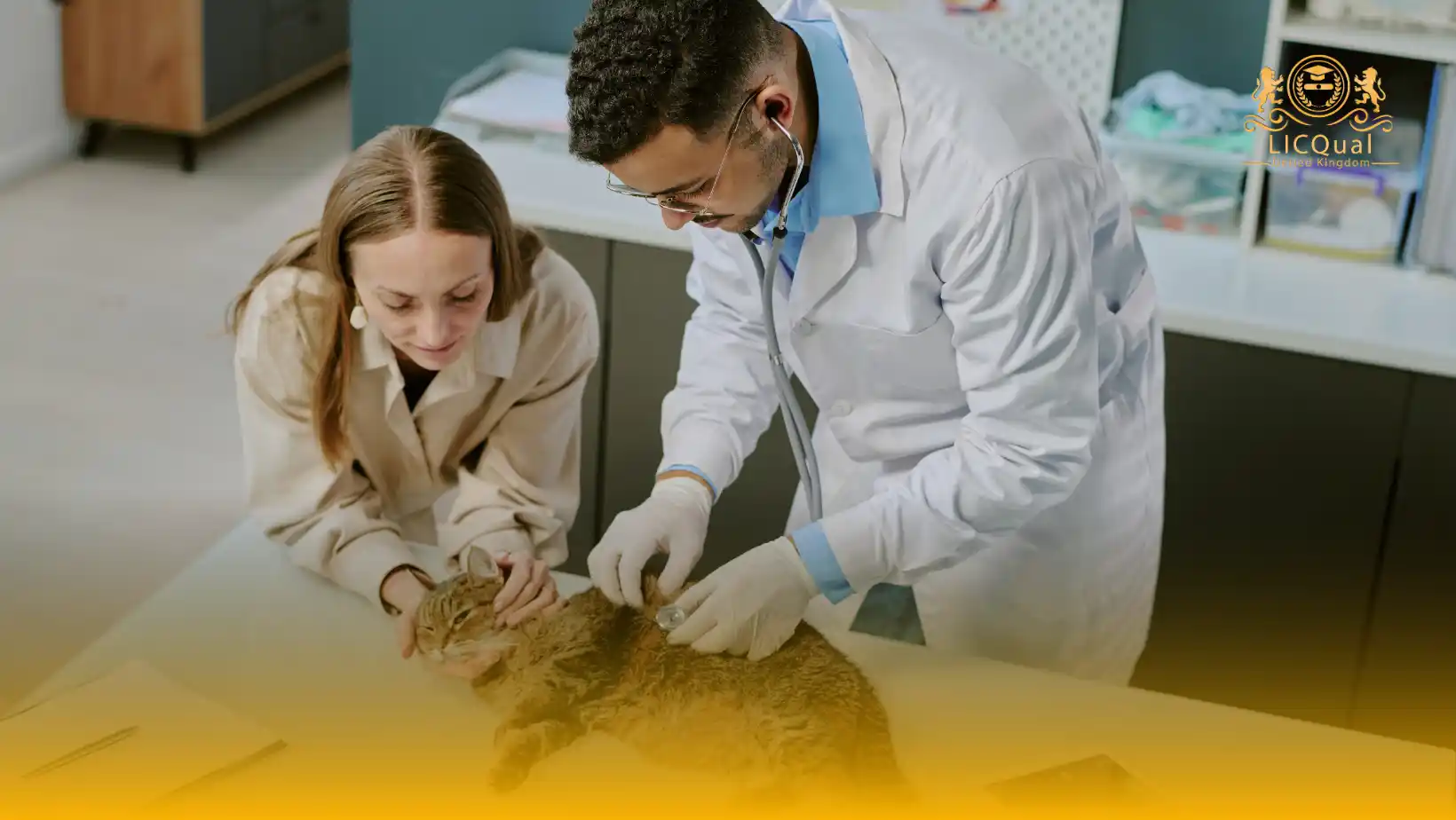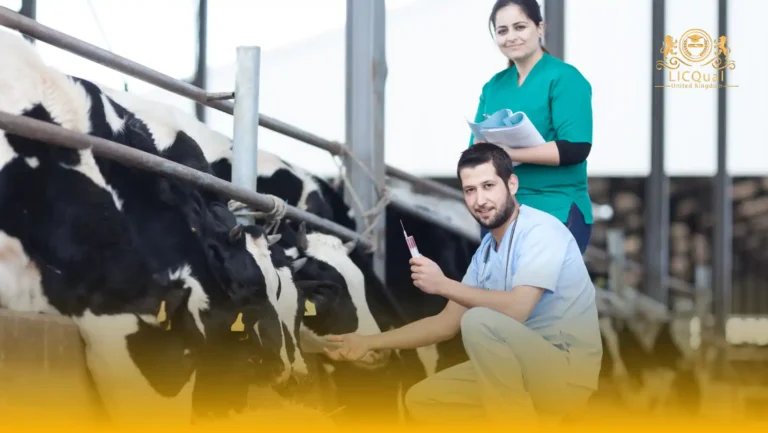The LICQual Level 3 Diploma in Veterinary Pharmacy (Dip Veterinary Pharmacy) is a specialized qualification designed for learners who wish to advance their expertise in veterinary medicines, pharmaceutical care, and animal health management. This diploma offers a comprehensive understanding of veterinary pharmacology, dispensing practices, legislation, and the safe use of medicines in animals, enabling learners to build both knowledge and practical skills for professional growth.
Aimed at those looking to enhance their career prospects, the programme supports learners in expanding their competence within the veterinary and pharmaceutical sectors while strengthening their Continuing Professional Development (CPD). By focusing on essential areas such as drug formulations, veterinary therapeutic interventions, and regulatory frameworks, the qualification prepares learners to meet the evolving demands of veterinary practice and animal healthcare services.
Centres delivering the LICQual Level 3 Diploma in Veterinary Pharmacy must ensure they have qualified and competent staff with relevant expertise, as well as access to the latest materials, facilities, and resources. This commitment guarantees a high standard of training delivery and provides learners with the necessary support for academic and professional success.
With its balance of theory, applied knowledge, and professional relevance, this diploma is ideal for learners aspiring to develop a strong foundation in veterinary pharmacy, gain recognition in their field, and make a meaningful contribution to the health and wellbeing of animals.
Course Overview
Qualification Title
LICQual Level 3 Diploma in Veterinary Pharmacy (Dip Veterinary Pharmacy)
Total Units
6
Total Credits
60
GLH
240
Qualification #
LICQ2201186
Qualification Specification
To enroll in the LICQual Level 3 Diploma in Veterinary Pharmacy (Dip Veterinary Pharmacy), applicants must meet the following criteria:
|
Qualification# |
Unit Title |
Credits |
GLH |
|---|---|---|---|
|
LICQ2201186-1 |
Principles of Veterinary Pharmacy Practice |
10 |
40 |
|
LICQ2201186-2 |
Veterinary Pharmacology and Therapeutics |
10 |
40 |
|
LICQ2201186-3 |
Formulation, Dispensing, and Administration of Veterinary Medicines |
10 |
40 |
|
LICQ2201186-4 |
Veterinary Regulations, Legislation, and Ethics |
10 |
40 |
|
LICQ2201186-5 |
Animal Health, Disease Management, and Medicines Use |
10 |
40 |
|
LICQ2201186-6 |
Research, Evidence-Based Practice, and Professional Development in Veterinary Pharmacy |
10 |
40 |
By the end of this course, learners will be able to:
Unit 1: Principles of Veterinary Pharmacy Practice
- Understand the scope, responsibilities, and role of veterinary pharmacy in animal healthcare.
- Apply principles of safe and effective veterinary pharmacy practice.
- Evaluate the contribution of veterinary pharmacy to public health and animal welfare.
Unit 2: Veterinary Pharmacology and Therapeutics
- Explain the principles of veterinary pharmacology, including pharmacokinetics and pharmacodynamics.
- Analyse the therapeutic effects and potential adverse reactions of veterinary medicines.
- Apply knowledge of drug classes to treatment strategies for different animal species.
Unit 3: Formulation, Dispensing, and Administration of Veterinary Medicines
- Demonstrate knowledge of pharmaceutical formulations used in veterinary practice.
- Apply accurate methods of dispensing and compounding veterinary medicines.
- Evaluate safe and effective administration techniques across animal species.
Unit 4: Veterinary Regulations, Legislation, and Ethics
- Understand legal frameworks governing the use, storage, and supply of veterinary medicines.
- Apply ethical principles to decision-making in veterinary pharmacy practice.
- Evaluate compliance with national and international veterinary medicine regulations.
Unit 5: Animal Health, Disease Management, and Medicines Use
- Identify common animal diseases and their treatment options.
- Apply rational use of medicines to improve animal health and wellbeing.
- Evaluate treatment protocols and their effectiveness in disease management.
Unit 6: Research, Evidence-Based Practice, and Professional Development in Veterinary Pharmacy
- Understand the role of research and evidence-based practice in veterinary pharmacy.
- Apply research skills including data collection, analysis, and critical evaluation.
- Demonstrate commitment to Continuing Professional Development (CPD) within veterinary pharmacy.
The LICQual Level 3 Diploma in Veterinary Pharmacy (Dip Veterinary Pharmacy) is designed for professionals and students who want to specialize in veterinary medicines, dosage management, and evidence‑based animal healthcare. This internationally accredited qualification is ideal for pharmacists, veterinarians, animal healthcare workers, and academic trainers who aim to strengthen their expertise in veterinary pharmacy. With flexible online study and global recognition, it is perfect for anyone seeking career advancement, credibility, and practical skills in veterinary medicine and pharmacy practice.
1. Practicing Pharmacists
- Gain advanced knowledge of veterinary medicines and animal pharmacology
- Strengthen compliance with veterinary healthcare standards and safety protocols
- Enhance credibility with an internationally recognized qualification
- Prepare for leadership roles in veterinary pharmacy and animal healthcare organizations
- Stay updated with evolving veterinary drug regulations and global practices
2. Veterinary Students and Graduates
- Build a strong foundation in veterinary pharmacy before entering the workforce
- Improve employability with a Level 3 diploma UK recognized
- Learn practical applications of veterinary pharmacokinetics and dosage adjustment
- Gain confidence in applying veterinary pharmacy principles in clinical practice
- Add a career‑ready certification to your academic portfolio
3. Veterinarians and Animal Healthcare Professionals
- Understand veterinary pharmacy across diverse animal healthcare settings
- Strengthen skills in evidence‑based prescribing and therapeutic monitoring
- Expand career opportunities with international accreditation
- Apply veterinary pharmacy principles in multidisciplinary animal healthcare teams
- Improve animal welfare through safe and effective drug therapy
4. Pharmaceutical Researchers
- Deepen expertise in veterinary drug formulation and delivery systems
- Strengthen research credibility with accredited certification
- Gain practical tools for designing and evaluating veterinary studies
- Improve career advancement opportunities in pharmaceutical R&D
- Enhance knowledge of veterinary pharmacology, bioavailability, and therapeutic monitoring
5. International Candidates
- Earn a globally recognized veterinary pharmacy qualification
- Access flexible online study from anywhere in the world
- Meet international accreditation standards for animal healthcare practice
- Strengthen career prospects in diverse veterinary markets
- Gain cross‑border knowledge of veterinary pharmacy and animal healthcare
6. Academic and Training Professionals
- Use the diploma to enrich teaching and training programs
- Gain structured knowledge of veterinary pharmacy for curriculum design
- Strengthen EEAT compliance in educational content delivery
- Provide students with internationally accredited learning pathways
- Enhance professional standing in veterinary and healthcare education
7. Career Changers and Aspiring Professionals
- Transition into veterinary pharmacy or animal healthcare with a recognized qualification
- Gain essential knowledge of veterinary medicines for new roles
- Build credibility in animal healthcare through accredited certification
- Learn practical skills for veterinary drug monitoring and evidence‑based practice
- Open doors to career opportunities in veterinary pharmacy, research, and animal healthcare sectors
Centres delivering the LICQual Level 3 Diploma in Veterinary Pharmacy must meet essential requirements to ensure learners receive high-quality training and professional support. These standards help guarantee that the qualification is delivered effectively and prepares learners for success in veterinary pharmacy and animal healthcare.
- Qualified and Experienced Staff: Centres must employ trainers and assessors with relevant academic qualifications and professional experience in pharmacy, veterinary pharmacy, or animal healthcare.
- Updated Learning Resources: Centres should provide access to the latest study materials, reference texts, and digital platforms to support veterinary pharmacy learning and assessment.
- Facilities and Infrastructure: Suitable classrooms, laboratories, and/or online platforms must be available to facilitate effective teaching, learning, and practical training.
- Assessment and Quality Assurance: Centres must implement robust internal assessment processes and maintain quality assurance systems to ensure fairness, accuracy, and consistency in learner achievements.
- Learner Support Services: Centres should provide guidance, mentoring, and feedback to help learners succeed academically and professionally.
- Commitment to CPD: Trainers and assessors must engage in Continuing Professional Development (CPD) to stay current with developments in veterinary pharmacy and pharmaceutical care.
- Compliance with Standards: Centres must adhere to LICQual’s policies, industry regulations, and international benchmarks to maintain excellence in delivery and outcomes.
Assessment and Verification
All units within this qualification are subject to internal assessment by the approved centre and external verification by LICQual. The qualification follows a criterion-referenced assessment approach, ensuring that learners meet all specified learning outcomes.
To achieve a ‘Pass’ in any unit, learners must provide valid, sufficient, and authentic evidence demonstrating their attainment of all learning outcomes and compliance with the prescribed assessment criteria. The Assessor is responsible for evaluating the evidence and determining whether the learner has successfully met the required standards.
Assessors must maintain a clear and comprehensive audit trail, documenting the basis for their assessment decisions to ensure transparency, consistency, and compliance with quality assurance requirements.







